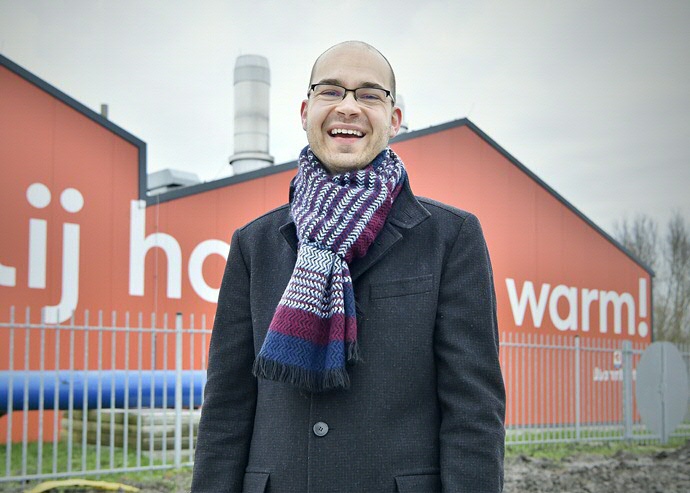Getting the energy transition done together

Groningen is building up to Climate Adaptation Week, an online, interactive festival revolving around the consequences of, and solutions to, climate change. It is a theme that is close to the heart of business expert Björn Mitzinneck. ‘Many of the really tricky problems we face involve people making not particularly smart choices. I’m really interested in how you organize people for the collective good.’
Text: Riepko Buikema, Communication UG, Photos: Elmer Spaargaren
And Mitzinneck will have the opportunity to get to the bottom of this puzzle. In early November, he was one of the lucky early-career scholars to be awarded a Veni grant. He will use it to study collaboration forms that could speed up the energy transition. ‘We have lots of great engineers doing terrific work on improving renewable technologies, but many of their innovations fail to be implemented. Social resistance can be a key factor in this. We lack insight into how best to help different partners, such as municipalities, businesses and citizens, to work together for mutual benefit.’

Everyone involved
To illustrate this, he cites the classic example of opposition to land-based wind turbines. ‘Local people have good reasons to object. But their resistance tends not to be in the best interest of society as a whole. Things like this can delay our efforts to transition to a more sustainable overall energy supply. We need to figure out how we can get everyone involved in the energy transition, so that we can find the solutions together.’
Fascinating
His fascination for the social side of climate adaptation developed gradually, explains Mitzinneck. As a teenager, he was convinced that he would have a career in engineering or science. ‘And then I discovered that people themselves are fascinating study objects. Trying to understand them is not rocket science – it seems even harder in some ways. People have minds of their own. We don’t follow something akin to laws of physics. Our behaviour constantly changes or fails to do so, although all rationality would suggest it should. For instance, how the findings of climate science triggered so little change internationally was truly mind-boggling to me.’ And so, his voyage of discovery began.
Optimistic
Mitzinneck was born in the Harz. He spent an exchange year in the USA while at secondary school, later worked in South Africa, and studied at Cambridge (UK) and Cornell (USA). ‘When you’re in a foreign country, you’re in for a surprise every single day. It’s never boring, because you learn things that you would never have thought about beforehand. It was very interesting to see how much more optimistic the North American mindset is compared to my native German culture. When Germans talk about two people having the same idea, we use the saying ‘Zwei Dumme – ein Gedanke’. Literally: Two fools, one thought. In America, the same proverb goes ‘Smart minds think alike’. That’s very optimistic compared to the more sober German outlook on the world.’
He has been working at the Faculty of Economics and Business in Groningen for the past two-and-a-half years, closer to his family. He has seen plenty of practical examples of the energy transition in the region. ‘Take the ambitious hydrogen plans in the Northern Netherlands’, says Mitzinneck, ‘or the construction of a heat grid at Zernike Campus and in the neighbouring districts of Selwerd and Paddepoel.’

Huge advances
In his native country, Mitzinneck studied so-called bioenergy villages. These are rural villages that convert to a local, renewable energy supply running on biomass from agricultural waste, for example. Lessons learned from these autonomous initiatives serve as good examples, says Mitzinneck. ‘These villages have made huge advances in getting regular people like you and me involved in the energy transition. Citizens were made co-owners and co-venturers; they were involved in constructing and running the renewable energy installations. That makes a massive difference in projects of this kind. There was usually far less social resistance.’
Mitzinneck discovered that emotions play a surprisingly large role in the success of local energy communities like this. ‘Biogas plants scared people initially. What if they were to burst? Will being co-owners of the plant drive us apart if we disagree about something? Will we really be able to pull this off collectively? Effective initiatives managed the associated emotions very successfully.’
Better choices
So Mitzinneck thinks that it is now time for the next step. Can we apply the lessons that we have learned from these relatively small initiatives to more complex collaborations? To initiatives involving several parties from very different backgrounds, such as municipalities, private businesses, local residents and special interest groups? ‘I hope to find out which mechanisms work best for such collaborative hybrid organizations. We might not find the silver bullet, in fact we probably won’t, but ideally my research will lead to a tool kit of approaches that will help the people in charge of these initiatives to make better choices.’

Remaining hopeful
Mitzinneck has another tool which he hopes will help to improve the world: education. ‘Shaping the minds of our future business leaders’, as he puts it. In a course on Energy Transition and Innovation, he and his colleagues ask students to investigate the potential of energy innovations up-close. ‘We have them look at real-life cases. The best student reports are then published for everyone to see and learn from. It is truly great to see our students develop an appreciation for the complexities involved in making an innovation successful in the market and society at large. This makes me very hopeful. Yes, I am optimistic. I’m hanging on to my American mentality.’
Additional information
- Contact: Björn Mitzinneck
- The Energy Innovation Atlas, a platform that maps innovations in the transitioning energy sector. The EIA consists of case reports and video summaries created by students, which are publicly available to practitioners.
More news
-
09 December 2025
Are robots the solution?
-
10 November 2025
Decentralization of youth care
